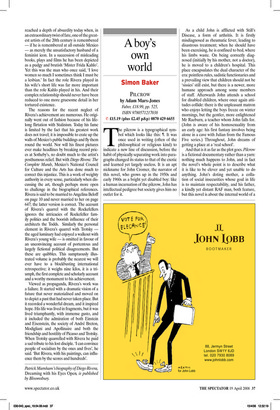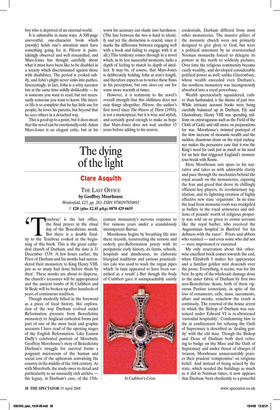A boy’s own world
Simon Baker
PILCROW by Adam Mars-Jones Faber, £18.99, pp. 525, ISBN 9780571217038 ✆ £15.19 (plus £2.45 p&p) 0870 429 6655 Tbe pilcrow is a typographical symol which looks like this: ¶. It was nce used in writing (often of the hilosophical or religious kind) to indicate a new line of discussion, before the habit of physically separating work into paragraphs changed its status to that of the exotic and learned yet largely useless. It is an apt nickname for John Cromer, the narrator of this novel, who grows up in the 1950s and early 1960s as a bright yet disabled boy: like a human incarnation of the pilcrow, John has intellectual pedigree but society gives him no
HeathVte122125 StatoSt HeathVte122125 StatoSt
outlet for it. As a child John is afflicted with Still’s Disease, a form of arthritis. It is firstly misdiagnosed as rheumatic fever, leading to disastrous treatment; when he should have been exercising, he is confined to bed, where his limbs waste. On being correctly diagnosed (initially by his mother, not a doctor), he is moved to a children’s hospital. This place encapsulates the dual character of the era: pointless rules, sadistic functionaries and a prevailing view that children should not be ‘sissies’ still exist, but there is a newer, more humane approach among some members of staff. Afterwards John attends a school for disabled children, where once again attitudes collide: there is the unpleasant matron who enjoys letting the boys freeze on winter mornings, but the gentler, more enlightened Mr Raeburn, a teacher whom John falls for. (John is aware of his homosexuality from an early age: his first fantasy involves being alone in a cave with Julian from the Famous Five series.) Throughout, John dreams of getting a place at a ‘real school’.
And that is it as far as the plot goes. Pilcrow is a fictional documentary rather than a yarn: nothing much happens to John, and in fact the novel’s whole point is to describe what it is like to be clever and yet unable to do anything. John’s doting mother, a collation of social insecurities whose goal in life is to maintain respectability, and his father, a kindly yet distant RAF man, both feature, r 10/04/08 1825 Pag 1 but this novel is about the internal world of a boy who is deprived of an external world.
It is admirable in many ways. A 500-page uneventful, one-character book which (mostly) holds one’s attention must have something going for it; Pilcrow is painstakingly observed and well researched, and Mars-Jones has thought carefully about what it must have been like to be disabled in a society which discriminated against those with disabilities. The period is evoked subtly, and John’s plight never sinks into pathos. Interestingly, in fact, John is a witty narrator but at the same time mildly dislikeable — he is someone you want to read, but not necessarily someone you want to know. His interior life is so complete that he has little use for people; he loves his parents, but beyond that he sees others in a detached way.
This is good up to a point, but it does mean that the novel can be emotionally cold. Adam Mars-Jones is an elegant critic, but at his worst his accuracy can shade into harshness. (The line between the two is hard to identify and yet the distinction is crucial, since it marks the difference between engaging well with a book and failing to engage with it at all.) This tendency comes through in a novel which, in its less successful moments, lacks a depth of feeling to match its depth of intellect. It may be, of course, that Mars-Jones is deliberately holding John at arm’s length, and therefore expects us to notice these flaws in his perception, but one does cry out for some more warmth at times.
However, it is testimony to the novel’s overall strength that this chilliness does not ruin things altogether. Pilcrow, the author’s first novel since The Waters of Thirst (1993), is not a masterpiece, but it is wise and stylish, and certainly good enough to make us hope that Mars-Jones does not wait another 15 years before adding to his oeuvre.



















































































 Previous page
Previous page